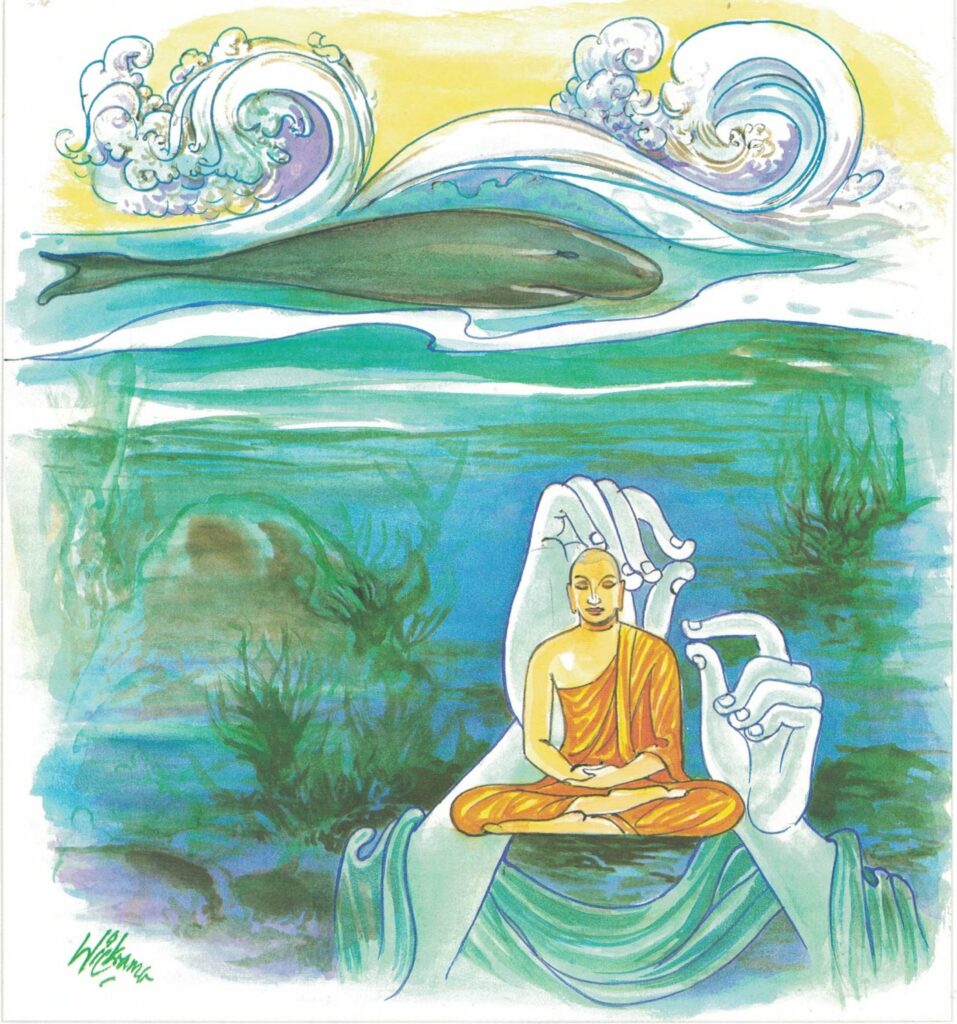Pali text, illustration and English translation of Dhammapada verse 82:
yathāpi rahado gambhīro vippasanno anāvilo |
evaṃ dhammāni sutvāna vippasīdanti paṇḍitā || 82 ||
82. Even as a fathomless lake, a lake so calm and clear, so dhammas having heard serene the wise become.

The Story of Kānamātā
While residing at the Jetavana Monastery, the Buddha spoke this verse, with reference to the mother of Kāna (Kānamātā).
Kānamātā was a devoted lay disciple of the Buddha. Her daughter Kāna was married to a man from another village. As Kāna had been on a visit to her mother for some time, her husband sent a message for her to come home. Her mother told her to wait for one more day as she wanted her to take some sweetmeats for her husband. The next day, Kānamātā made some sweet-meats, but when four monks stood at her door for alms she offered some to them. The four monks told other monks about the sweetmeats from Kānamātā’s house and they also came to stand at her door. Kānamātā, as a devotee of the Buddha and his disciples, offered her sweetmeats to the monks as they came in, one after another. The result was that in the end there was none left for Kāna and she did not go home on that day. The same thing happened on the next two days; her mother made some sweetmeats, the monks stood at her door, she offered her sweetmeats to the monks, there was nothing left for her daughter to take home, and her daughter did not go home. On the third day, for the third time, her husband sent her a message, which was also an ultimatum stating that if she failed to come home the next day, he would take another wife. But on the next day also, Kāna was unable to go home because her mother offered all her sweetmeats to the monks. Kāna’s husband then took another wife and Kāna became very bitter towards the monks. She used to abuse all monks so much so that the monks kept away from the house of Kānamātā.
The Buddha heard about Kāna and went to the house of Kānamātā; there she offered him some rice gruel. After the meal, the Buddha sent for Kāna and asked her, “Did my monks take what was given them or what was not given them?” Kāna answered that the monks had taken only what was given them, and then added, “They were not in the wrong; only I was in the wrong.” Thus, she owned up her fault and she also paid homage to the Buddha. The Buddha then gave a discourse. At the end of the discourse, Kāna attained sotāpatti fruition.
On the way back to the monastery, the Buddha met King Pasīnadi of Kosala. On being told about Kāna and her bitter attitude towards the monks, King Pasenadi asked the Buddha whether he had been able to teach her the dhamma and make her see the truth (dhamma). The Buddha replied, “Yes, I have taught her the dhamma, and I have also made her rich in her next existence.” Then the king promised the Buddha that he would make Kāna rich even in this existence. The king then sent his men with a palanquin to fetch Kāna. When she arrived, the king announced to his ministers, “Whoever can keep my daughter Kāna in comfort may take her.” One of the ministers volunteered to adopt Kāna as his daughter, gave her all his wealth, and said to her, “You may give in charity as much as you like.” Every day, Kāna made offerings to the monks at the four city-gates. When told about Kāna giving generously in charity, the Buddha said, “Monks, the mind of Kāna which was muddled was made clear and calm by my words.”
Explanatory Translation (Verse 82)
yathā api gambhīro rahado vippasanno anāvilo
evaṃ paṇḍitā dhammāni sutvāna vippasīdanti
yathā api: just as; gambhīro [gambhīra]: the deep; rahado [rahada]: ocean; vippasanno [vippasanna]: is very clear; anāvilo [anāvila]: and is not turbulent; evaṃ: in the same way; paṇḍitā: the wise ones; dhammāni: the Teaching; sutvāna: having heard; vippasīdanti: become purified mentally
The exceedingly deep oceans are tranquil, calm and are not agitated. In the same way those wise ones who listen to the words of the Buddha acquire deep awareness and are extremely calm and tranquil.
Commentary and exegetical material (Verse 82)
rahado gambhīro: the deep ocean. In this stanza, the purity of mind experienced by those who have heard the word of the Buddha, is declared to be similar to the clarity of the water of the deep oceans. The ordinary masses who have not had the advantage of listening to the word of the Buddha are impure in mind, agitated and troubled.